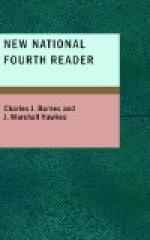* * * * *
LESSON XXXV.
pre sume’, suppose; think without being sure.
mus’cles, those parts of the body which give
us
motion, and by which we exert our strength.
ex tent’, space; distance.
or’di na ry, common; usual.
knowl’edge, that which is known through study.
de gree’, measure, as of space or time.
spent, used up; exhausted.
snapped, broken off.
de tached’, taken away from.
* * * * *
WHY AN APPLE FALLS.
“Father,” said Lucy, “I have been reading to-day that Sir Isaac Newton was led to make a great discovery, by seeing an apple fall from a tree. What was there wonderful about the apple falling?”
“Nothing very wonderful in that,” replied her father; “but it set him to thinking of what made it fall.”
“Why, I could have told him that,” said Lucy; “because the stem snapped and there was nothing to support it.”
“And what then?” asked her father.
“Why, then, of course it must fall.”
“Ah!” said her father, “that is the point: why must it fall?”
“I am sure I don’t know,” said Lucy. “I presume it was because there was nothing to keep it up.”
“Well, Lucy, suppose there was not—does it follow that it must come to the ground?”
“Yes, certainly,” replied Lucy, wonderingly.
“Let us see,” said her father; “but first answer this question: What is an animate object?”
“Any thing that has animal life, and power to move at will,” replied Lucy.
“Very good,” said her father; “now, what is an inanimate object?”
“Any thing that does not possess animal life, or can not move at will.”
“Very good again,” said her father. “Now an apple is, of course, an inanimate object; and therefore it could not move itself, and Sir Isaac Newton thought that he would try to find out what power moved it.”
“Well, then,” said Lucy; “did he find that the apple fell, because it was forced to fall?”
“Yes,” replied her father; “he found that there was some force outside of the apple itself that acted upon it, otherwise it would have remained forever where it was, no matter if it were detached from the tree.”
“Would it, indeed?” asked Lucy.
“Yes, without doubt,” replied her father, “for there are only two ways in which it could be moved—by its own power of motion, or the power of something else moving it. Now the first power, you know it does not have; so the cause of its motion must be the second.”
“But every thing falls to the ground as well as an apple, when there is nothing to keep it up,” said Lucy.
“True. There must therefore be some power or force which causes things to fall,” said her father.




